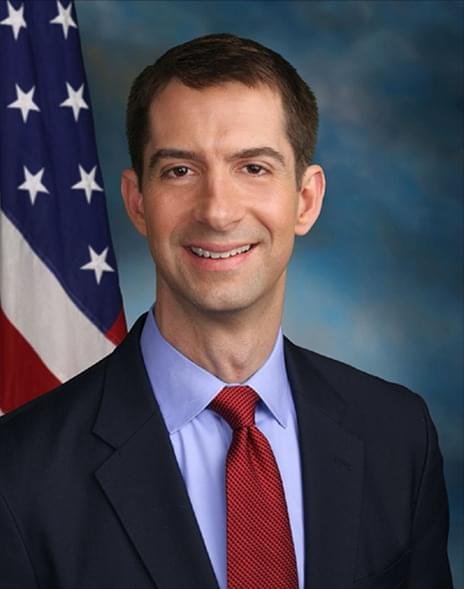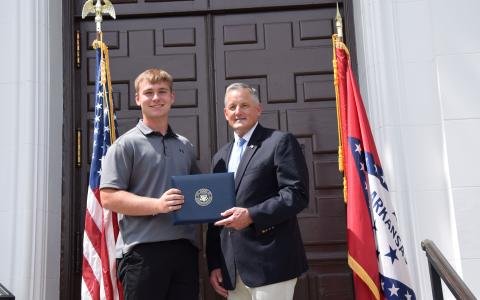WASHINGTON— U.S. Senator John Boozman (R-AR), ranking member of the U.S. Senate Committee on Agriculture, Nutrition, and Forestry, detailed how the recently released Republican farm bill framework puts “more farm in the farm bill” and how it can be used as the basis for a bipartisan path forward in a speech on the Senate floor.
“We believe that our framework reflects the chamber’s shared commitments across all twelve titles while putting more farm in the farm bill, something we’ve been calling for since the onset,” Boozman said. “Our farmers, ranchers, foresters, consumers, lenders and other stakeholders helped us fashion a farm bill that meets their varying needs. It’s a delicate balance… …but on the agriculture committee, we have shown we can come together to carry these heavy lifts across the finish line.”
The following are Boozman’s remarks as prepared:
Mr. President,
Prior to breaking for the Memorial Day recess, the House Agriculture Committee did something few beltway pundits thought was possible.
The committee approved, in a bipartisan manner, a farm bill that meets the needs of farmers, ranchers, foresters, rural communities and consumers across America.
I commend Chairman GT Thompson for his stewardship of this bill through an open process that let every committee member have a say in the bill.
Likewise, I want to express my appreciation for each of the members that voted to advance this legislation out of committee.
Chairwoman Stabenow also recently released her farm bill framework, putting the Senate Majority’s priorities on paper and advancing the discussion forward.
Cumulatively, these efforts exhibit the first real progress toward passage of a new farm bill since the process began two years ago.
This week, Republicans on the agriculture committee are building on that momentum by releasing our farm bill framework.
We believe that our framework reflects the chamber’s shared commitments across all twelve titles while putting more farm in the farm bill, something we’ve been calling for since the onset.
And let’s talk about what that means.
It means we direct additional resources to the tools farmers rely upon -- and they are calling for us to invest in -- while ensuring we do no harm to our nutrition programs, which account for over eighty percent of the bill’s baseline spending.
For example, we double funding for the farm bill’s premiere trade programs to help increase our competitiveness overseas.
This is desperately needed considering we are projected to see a record $32 billion agricultural trade deficit this year.
U.S. farmers have been able to point to their positive trade balance in agriculture as a source of pride for the better part of the last 50 years as they worked to feed, clothe and fuel the world.
Unfortunately, this administration’s refusal to engage on the issue has created an agricultural trade imbalance that is projected to reach record heights and is showing no signs of slowing.
Our framework can help reverse this unsustainable trend.
Another area where we double funding is agricultural research.
Our public-sector investment in agricultural research lags other developed economies and has fallen by more than a third over the past two decades.
This is another concerning trend that our framework can help reverse.
Agricultural research programs spur innovation and productivity -- allowing farmers to produce more while using less and in an environmentally friendly manner, even as threats from pests, diseases and unpredictable weather become more common.
Not only do our farmers gain in the long-term, but our land-grant institutions and colleges of agriculture who conduct groundbreaking research see immediate benefits— a win-win investment.
We also make a historic investment in the conservation title while ensuring programs remain locally-led and flexible.
Farmers, ranchers and foresters have diverse conservation needs and our framework reflects that, providing equity across practices to address drought, water quality, wildlife habitat biodiversity, soil erosion and climate resiliency while continuing to provide for carbon sequestrating and greenhouse gas reducing practices.
Our framework increases funding in the conservation title by more than 25% every single year moving forward while making sure its programs continue to empower producers to make the best decisions to meet the resource concerns of their operation.
Our farmers, ranchers and foresters also need investments in the communities they call home, and our framework makes those too.
It is no secret that rural America has seen more than its share of difficulties over the past few years.
Recent census data shows over half the nation’s rural counties have lost population.
These communities must have the modern infrastructure necessary to attract and retain talent.
Our framework offers help by making significant investments in small business development, broadband expansion, water and energy infrastructure programs, as well as funds to increase access to rural healthcare, childcare and public safety.
Most importantly, putting more farm in the farm bill requires a modernized farm safety net.
We accomplish this by giving producers access to risk management tools that reflect the nature of the challenges under which they operate.
And as I’ve stressed before, this isn’t an either-or decision—meaning farmers won’t be forced to choose between crop insurance and vital Title One programs.
Our framework makes crop insurance more accessible and affordable and makes meaningful increases to statutory reference prices for all producers, of all commodities, in every region.
The safety net programs our farmers operate under right now are outdated.
We cannot consider a farm bill that fails to recognize and protect farmers from the historic inflation in input costs they now face on the farm.
The world, and agriculture in particular, are in a much different place today than they were during the last farm bill.
Farmers are already experiencing unprecedented challenges and economic uncertainty for the crops they are sowing into the ground right now.
This follows historic inflation, a record trade deficit, rising interest rates, devastating natural disasters, and geopolitical unrest that have shrunk the bottom line for farmers.
Under this President, U.S. farmers have seen the largest decline in farm income of all time.
And like I said, that is only expected to get worse if we fail to put more farm in the farm bill.
In my home state of Arkansas, where agriculture accounts for about a quarter of the state’s GDP, inflation adjusted net farm income is expected to decline by more than 40% compared to 2 years ago.
This trend is playing out across the nation, which is why reference price increases have been the top ask from farmers at the over twenty farm bill roundtables my colleagues and I have held around the country.
While each of these states have diverse agriculture economies, the refrain has been consistent.
In fact, it was at one of my earliest roundtables in North Dakota where the mantra of “more farm in the farm bill” was born.
It wasn’t a Republican senator who first said it.
It was a plea from a farmer.
And that is what this is truly about.
Our farmers, ranchers, foresters, consumers, lenders and other stakeholders helped us fashion a farm bill that meets their varying needs.
It’s a delicate balance made even more difficult this time around by the way actions taken outside of the farm bill have impacted our baseline.
But on the agriculture committee we have shown we can come together to carry these heavy lifts across the finish line.
I have been proud to partner with Chairwoman Stabenow to shepherd significant reforms into law on priority issues, particularly in the climate and nutrition spaces.
Together, we worked to enact the Growing Climate Solutions Act, making it easier for producers to participate in emerging voluntary carbon credit markets.
And we passed that bill with the support of over ninety of our colleagues.
In the nutrition space, we worked to pass the Keep Kids Fed Act which extended needed flexibilities to schools and meal providers for an additional year at a time when supply chain breakdowns persisted and food costs soared because of inflation.
Perhaps the achievement I am most proud of was our successful effort to modernize the outdated summer meals program to reach more food-insecure children, in both rural and urban communities, filling the gap children face during the months when classes are out.
Marking the first substantial reform to the summer meals program in over sixty years, this investment of over $20 billion ensures that children will never again face hunger in the summer months.
That is what our work here is all about.
Identifying a problem, and then coming together to solve it.
We’ve proven we can do that in the past.
I believe, with all my heart, that we can do it again by passing a bipartisan farm bill.
I look forward to taking our two frameworks, forging a bipartisan farm bill and passing it into law before the 118th session of Congress comes to a close.























